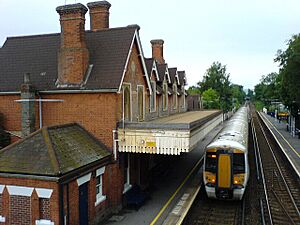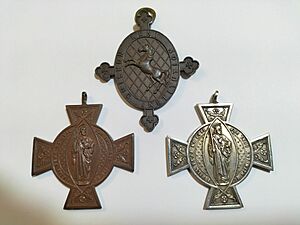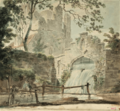West Malling facts for kids
Quick facts for kids West Malling |
|
|---|---|
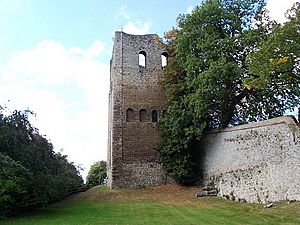 St. Leonard's Tower, West Malling |
|
| Population | 2,590 (2011) |
| OS grid reference | TQ685575 |
| District | |
| Shire county | |
| Region | |
| Country | England |
| Sovereign state | United Kingdom |
| Post town | WEST MALLING |
| Postcode district | ME19 |
| Dialling code | 01732 |
| Police | Kent |
| Fire | Kent |
| Ambulance | South East Coast |
| EU Parliament | South East England |
| UK Parliament |
|
West Malling (/ˈmɔːlɪŋ/ MAW-ling) is a lovely market town in Kent, England. It's a place where people used to gather to buy and sell goods. The town is located in the Tonbridge and Malling area and has a population of about 2,590 people.
Contents
Historic Buildings and Places
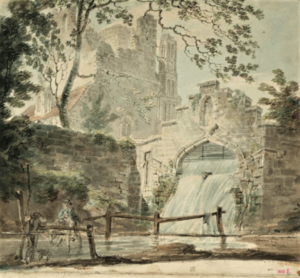
West Malling is full of old and interesting buildings. One of the most famous is St Leonard's Tower. This tower is a Norman "keep," which is a strong, central tower of a castle. It was built by a bishop named Gundulf between 1077 and 1108. He was a very busy builder! He also helped build the famous White Tower in London, and castles in Rochester and Colchester.
Around 1090, Bishop Gundulf also started St. Mary's Abbey in West Malling. This abbey was a home for Benedictine nuns, who are a group of religious women. The abbey has buildings from many different time periods, including Norman, medieval, Tudor, and Georgian times. Today, Anglican Benedictine nuns live there. They have a special church built in 1966 that is considered a Grade II* listed building, meaning it's very important historically.
Other cool old buildings in West Malling include the Prior's House, which was once a place for people with leprosy. Ford House is over 600 years old! The main street, called High Street, has many buildings from the Georgian era. The Swan Hotel is an old inn from the 1700s where coaches used to stop. Went House, built around 1720, is known for its beautiful brickwork.
Just south of the town is Manor Park Country Park. This park used to be part of the grounds of a large house called Douce's Manor.
Around 1791, a famous artist named J. M. W. Turner painted a beautiful watercolour picture of St Mary's Abbey and a waterfall on Swan Street. That waterfall is still there today!
For places of worship, West Malling has St Mary's Church (Anglican) and West Malling Baptist Church, which was built in 1836.
Kings Hill Community
Kings Hill is a newer area near West Malling. It's a mix of homes and businesses that was created from parts of West Malling and other nearby villages. In 2004, a report said that Kings Hill had the highest average income in Great Britain, meaning many people living there earned a lot of money.
Getting Around West Malling
West Malling is about 35 miles (56 km) from central London. It's located near the main road, the A20, which connects London to the ferry ports of Folkestone and Dover. Because it's easy to get to by road and train, many people who work in London choose to live here.
Train Travel
West Malling station is on the edge of town and is part of the Kent Downs line. Southeastern Trains runs regular services from here to London Victoria, Maidstone East, and Ashford International. A train ride to London takes about one hour.
Because of the new Kings Hill area, the station is sometimes called West Malling for Kings Hill. A new road was built in 2007 to connect the station to the West Malling bypass, which helps reduce traffic in the town's main street.
Road Travel
West Malling was originally built on the main road between London and the Kent coast. Today, it's about 1 mile (1.6 km) from junction 4 of the M20 and junction 2 of the M26. The M26 connects to the M25, which is a large motorway that goes around London.
Bus Services
Bus services in West Malling are mainly provided by Arriva Kent and Surrey and Nu-Venture. These buses connect the town to other places like Chatham, Maidstone, Rochester, and Tunbridge Wells.
Air Travel History
In the 1930s, an airport called Maidstone Airport was built two miles from West Malling, at Kings Hill. During the Second World War, this airport became RAF West Malling and was used by RAF fighter planes. In the 1960s, some US Navy squadrons were also based there. The airfield closed in 1967, but it hosted some popular airshows until 1987. After that, the area was developed into the new community of Kings Hill.
Healthcare History
The Kent Nursing Institute was started in West Malling in 1875. It was a private nursing service that also had a branch in Tunbridge Wells. It was supported by donations and payments. There was a nursing institute in West Malling from at least 1881 until the end of the First World War.
In 1881, Eva Luckes, who was in charge of nurses at The London Hospital, helped train some new nurses from the institute. Nurses who worked there for five or ten years received special badges.
During the First World War, the Tunbridge Wells branch of the institute became a hospital for both civilians and soldiers.
Notable Nursing Staff
- Agnes Theodosia Kelly (1863–1929) was the Lady Superintendent (like a head nurse) of the West Malling branch from 1902 to 1916. She trained under Eva Luckes at The London Hospital. She also led a special hospital for volunteers during World War I in West Malling until 1919.
Local News and Media
Newspapers
West Malling has its own local newspaper, the Malling edition of the Kent Messenger. There is also a Kings Hill edition of the Sevenoaks Chronicle.
Television
Local news and TV shows for West Malling come from BBC South East and ITV Meridian. You can get these signals from the Bluebell Hill TV transmitter. You can also sometimes get BBC London and ITV London from the Crystal Palace TV transmitter.
Radio
The local radio station for West Malling is KMFM Maidstone. You can also listen to county-wide stations like BBC Radio Kent, Heart, and Gold.
Sports in West Malling
West Malling is believed to be the place where the first recorded cricket match in Kent happened! The Old County Ground, near Norman Road, was once where big county cricket games were played. We know that in 1705, a team called West of Kent played against Chatham in Malling.
The famous author Charles Dickens wrote about a cricket match in his book The Pickwick Papers. People think the cricket ground he described was a mix of the grounds at West Malling and Maidstone. An old drawing of the match, which was even on the back of a £10 banknote featuring Dickens, looks a lot like West Malling.
Kings Hill also has a golf course that opened in 1995. Visitors are welcome to play there.
Famous People from West Malling
- Aretas Akers-Douglas, 1st Viscount Chilston: A politician who was born at St. Mary's Abbey in West Malling in 1851.
- John Downman: An artist who lived in Went House, West Malling, starting in 1804.
- Wing Commander Guy Gibson: A brave pilot and leader of "The Dambusters" during World War II. He was stationed at RAF West Malling in 1941. His signature is still on the ceiling of a cellar at Douce's Manor, which was used by airmen.
- Tony Hudgell: A young fundraiser who lives in Kings Hill with his adoptive parents.
- William Perfect: A surgeon and doctor who helped people with mental illness. He lived in West Malling from 1756 until he passed away in 1809.
- Lt. Col. A.D. Wintle: A well-known soldier who lived in Coldharbour House in West Malling.
- Gladys Wright: A person who supported physical education for women, born here in 1891.
Images for kids
See also
 In Spanish: West Malling para niños
In Spanish: West Malling para niños
 | Selma Burke |
 | Pauline Powell Burns |
 | Frederick J. Brown |
 | Robert Blackburn |



